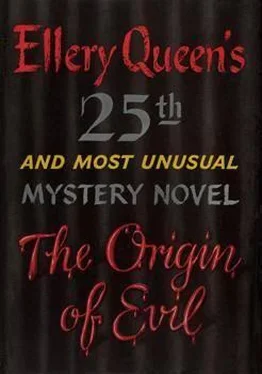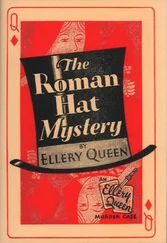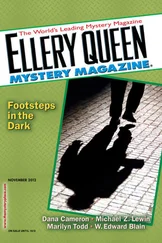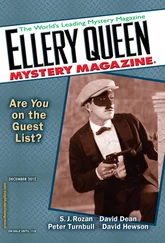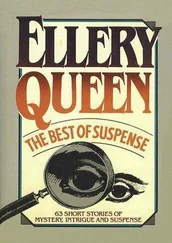“I wouldn’t repeat it,” said the patrolman excitedly. “I wouldn’t lower myself. They think I’m drunk. What do they think I am? Sunday morning! I’ve seen a lot of crosseyed things in this town, but―”
“Here, get hold of yourself, Officer. Has Lieutenant Keats been notified, do you know?”
“They caught him at home. He’s on his way here now.”
Ellery bounded up the steps. As he ran into the hall he saw Delia. She was dressed for town, in black and modest dress, hat, and gloves, and she was leaning against a wall bloodlessly. Alfred Wallace, disheveled and unnerved, was holding one of her gloved hands in both of his, whispering to her. The tableau dissolved in an instant; Delia spied Ellery, said something quickly to Wallace, withdrawing her hand, and she ran forward. Wallace turned, rather startled. He followed her with a hasty shuffle, almost as if he were afraid of being left alone.
“Ellery.”
“Is Mr. Priam all right?”
“He’s had a bad shock.”
“Can’t say I blame him,” Wallace mumbled. The handsome man passed a trembling handkerchief over his cheeks. “The doctor’s on his way over. We can’t seem to snap Mr. Priam out of it.”
“What’s this about ‘fogs,’ Delia?” Ellery hurried up the hall, Delia clinging to his arm. Wallace remained where he was, still wiping his face.
“Fogs? I didn’t say fogs. I said―”
Ellery stopped in the doorway.
The other radio car patrolman was straddling a chair, cap pushed back on his head, looking about helplessly.
Roger Priam lay stiffly on his bed staring at the ceiling.
And all over Priam’s body, on his blanket, on his sheet, in the shelves and compartments of his wheelchair, on his typewriter, strewn about the floor, the furniture, Wallace’s emergency bed, the window sills, the cornices, the fireplace, the mantelpiece ― everywhere ― were frogs.
Frogs and toads.
Hundreds of frogs and toads.
Tiny tree toads.
Yellow-legged frogs.
Bullfrogs.
Each little head was twisted.
The room was littered with their corpses.
Ellery had to confess to himself that he was thrown. There was a nonsense quality to the frogs that crossed over the line of laughter into the darker regions of the mind. Beyond the black bull calf of the Nile with the figure of an eagle on his back and the beetle upon his tongue stood Apis, a god; beyond absurdity loomed fear. Fear was the timeless tyrant. At mid-twentieth century it took the shape of a gigantic mushroom. Why not frogs? With frogs the terrible Wrath of the Hebrews had plagued the Egyptian, with frogs and blood and wild beasts and darkness and the slaying of the first-born... He could hardly blame Roger Priam for lying frozen. Priam knew something of the way of gods; he was by way of being a minor one himself.
While Keats and the patrolmen tramped about the house, Ellery drifted around the Priam living room trying to get a bearing. The whole thing irritated and enchanted him. It made no sense. It related to nothing. There lay its power over the uninitiated; that was its appearance for the mob. But Priam was of the inner temple. He knew something the others did not. He knew the sense this nonsense made. He knew the nature of the mystery to which it related. He knew the nature of this primitive god and he grasped the meaning of the god’s symbolism. Knowledge is not always power; certainty does not always bring peace. This knowledge was paralyzing and this certainty brought terror.
Keats found him nibbling his thumb under the Spanish grandee.
“Well, the doctor’s gone and the frogs are all collected and maybe you and I had better have a conference about this.”
“Sure.”
“This is what you’d call Priam’s third warning, isn’t it?”
“Yes, Keats.”
“Me,” said the detective, seating himself heavily on a heavy chair, “I’d call it broccoli.”
“Don’t make that mistake.”
Keats looked at him in a resentful way. “I don’t go for this stuff, Mr. Queen. I don’t believe it even when I see it. Why does he go to all this trouble?” His tone said he would have appreciated a nice, uncomplicated bullet.
“How is Priam?”
“He’ll live. The problem was this doctor, Voluta. It seems we took him away from a party ― a blonde party ― at Malibu. He took the frogs as a personal insult. Treated Priam for shock, put him to sleep, and dove for his car.”
“Have you talked to Priam?”
“I talked to Priam, yes. But he didn’t talk to me.”
“Nothing?”
“He just said he woke up, reached for that push-button-on-a-cord arrangement he’s got for turning on the lights, saw the little beasties, and knew no more.”
“No attempt at explanation?”
“You don’t think he knows the answer to this one!”
“The strong man type represented by our friend Priam, Lieutenant,” said Ellery, “doesn’t pass out at the sight of a few hundred frogs, even when they’re strewn all over his bed. His reaction was too violent. Of course he knows the answer. And it scares the wadding out of him.”
Keats shook his head. “What do we do now?”
“What did you find out?”
“Not a thing.”
“No sign of a point of entry?”
“No. But what sign would there be? You come from the suspicious East, Mr. Queen. This is the great West, where men are men and nobody locks his door but Easterners.” Keats rolled a tattered cigaret to the other side of his mouth. “Not even,” he said bitterly, “taxpayers who are on somebody’s knock-off list.” He jumped up with a frustrated energy. “The trouble is, this Priam won’t face the facts. Poison him, and he looks thoughtful. Toss a couple hundred dead frogs around his bedroom and he shakes his head doubtfully. You know what I think? I think everybody in this house, present company excepted, is squirrel food.”
But Ellery was walking a tight circle, squinting toward some hidden horizon. “All right, he got in without any trouble ― simply by walking in. Presumably in the middle of the night. Priam’s door isn’t locked at night so that Wallace or the others can get at him in an emergency, consequently he enters Priam’s room with equal facility. So there he is, with a bag or a suitcase full of murdered frogs. Priam is asleep ― not dead, mind you, just asleep. But he might just as well have been dead, because his visitor distributed two or three hundred frogs about the premises ― in the dark, mind you ― without disturbing Priam in the least. Any answers, Lieutenant?”
“Yes,” said Keats wearily. “Priam polished off a bottle last night. He was dead ― dead to the world.”
Ellery shrugged and resumed his pacing. “Which takes us back to the frogs. A cardboard box containing... we don’t know what;4 that’s warning number one. Food poisoning... that’s warning number two. Warning number three... a zoo colony of dead frogs. One, unknown; two, poisoned food; three, strangled frogs. It certainly would help to know number one.”
“Suppose it was a fried coconut,” suggested Keats. “Would it help?”
“There’s a connection, Lieutenant. A pattern.”
“I’m listening.”
“You don’t just pick frogs out of your hat. Frogs mean something.”
“Yeah,” said Keats, “warts.” But his laugh was unconvincing. “Okay, so they mean something. So this all means something. I don’t give a damn what it means. I said, what kind of maniac is this Priam? Does he want to shove off? Without putting up a battle?”
“He’s putting up a battle, Lieutenant,” frowned Ellery. “In his peculiar way, a brave one. To ask for help, even to accept help without asking for it, would be defeat for Priam. Don’t you understand that? He has to be top man. He has to control his own destiny. He has to, or his life has no meaning. Remember, Keats, he’s a man who’s living his life away in a chair. You say he’s asleep now?”
Читать дальше
